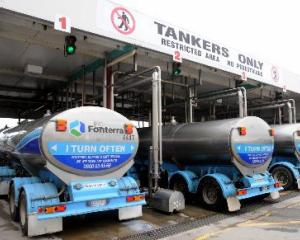A proposal to slash the size of the Fonterra board from 13 to nine came in for hot debate by shareholders at the co-operative's annual meeting yesterday in the small Waikato town of Waitoa.
Former directors Colin Armer and Greg Gent put forward the suggestion for a smaller board in order to make a ''fitter, leaner, more agile Fonterra'', saying the move would improve board efficiency and decision-making. The pair said boards with double-digit numbers were rare and having six elected board members and three appointed would ensure there were ''no passengers on board''.
The resolution received 54% support from postal and electronic voting and a resounding applause from shareholders at the meeting but to succeed, it needs to achieve 75% support from voting shareholders along with 50% support from shareholder councillors.
The resolution was opposed by the board and Shareholders' Council, which both said a governance review already under way was a better option. Shareholders have been told the review means an information booklet is sent to them early next year, farmer consultations in February, and a May-June vote at a special meeting.
Mr Armer questioned why the governance review, first promised at an annual meeting three years ago and then sidelined, had been so hastily resumed once the resolution was put forward. He also said the board had misrepresented the resolution in the board papers by saying it would involve all directors standing down at once, when independent directors would remain in place to ensure continuity of business.
Director Malcolm Bailey told the meeting, at Fonterra's UHT plant in Waitoa, that external advice and a lot of work had been done on the governance review and it had been ready to take it to farmers for consultation, but the botulism scare occurred and the decision was made to shelve it for a while.
''We felt there was no burning platform, but it is clear from this that there is a roughly 50:50 split from shareholders on this and we now have to find a way to bring you all back together and find a proposal that can get wider support,'' he said.
Fonterra chairman John Wilson said shareholders had to ''take the time to get it right'' and it was important any review be comprehensive and that representation was looked at in its entirety rather than focusing on just one aspect, such as board size.
Shareholders were also asked to vote on a resolution keeping directors' remuneration at the same level as last year, though one shareholder questioned whether the board had considered dropping it, given the depressed global dairy prices and lower farm-gate payout.
The chairman receives $405,000 annually while each director is paid $165,000. At the board's discretion, the chairmen of board committees are paid an additional $31,000.
Earlier, council chairman Duncan Coull said when times were tough it was easy to start questioning the purpose of the co-operative, but they had to ''stay united'' and work collectively to overcome any challenges. However, the council was looking for a significant uplift in the returns paid to shareholder farmers.
Fonterra affirmed its guidance for the 2016 milk payout to farmers, although Mr Wilson said it was dependent on global dairy prices rising in the first half of next year from unsustainable levels now.
The world's largest dairy exporter has forecast a farm-gate milk price of $4.60 kg/ms and a cash dividend of 35c-to-40c per share for a total payout of $4.95-$5 kg/ms.
Fonterra has faced a challenging year globally with low dairy prices and a continued imbalance in supply and demand, which had a strong impact on the 2015 payout. Mr Wilson said it was still disappointing that Fonterra's payout was only third-highest among New Zealand's dairy companies.
His three priorities for the coming year were: lifting the dairy payout, driving higher returns for Fonterra, and reviewing the governance structure.
- BusinessDesk




